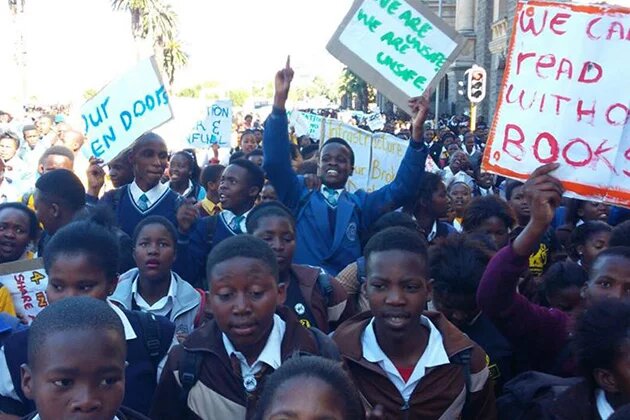
EE members had been running school-based campaigns about quality school infrastructure; access to dignified sanitation; access to functional computer and science laboratories and school libraries; an improved standard of teaching; better access to necessary textbooks; an end to corporal punishment; an end to the suspension of pregnant learners; access to condoms and proper sex education; access to sport and after school programmes; and finally safe schools which are secure against crime. They had identified these as factors in need of urgent action,which collectively produce a poor quality and unequal education system, one divided between the suburbs on the one hand, and the townships and rural areas on the other. At the march, equalisers handed over a memorandum addressing these issues and their demands.
Addressing the march Debbie Schaffer, the new MEC for Education in the Western Cape,
acknowledged that the demands presented by EE members were fundamental in realising the right to decent, equal education for all learners. She promised to substantively respond by 30 November 2014.
The march received fantastic coverage:
- Students demand an end to unequal education
- Pupils demand safety at schools
- EE’s Press Statement on the march
You can also view photos of the march here and a short video here.
Much else continues aside from this campaign in Cape Town. EE Gauteng recently secured an additional R150m for school sanitation. That campaign, like the one in the Western Cape, is part of national efforts to begin ensuring implementation of the new Minimum Norms and Standards for School Infrastructure secured by EE last year. The date by which all provinces must provide the Minister with their implementation plans, 29 November, is fast approaching.
The Bookery, a project established by EE, just opened its 40th school library and its first in the Eastern Cape. At the same time, EE just opened its first permanent office in the Eastern Cape, in King Williams Town. Youth group meetings, relationship building with schools, and preparation to drive the implementation of the norms and standards have all begun.
Lastly, we continue to explore new issues that require attention. EE and the EE Law Centre recently organized two full-day workshops, one on learning and teaching and one on the threat posed by education privatization. The former was attended by top academics from around the country, and the latter brought civil society organisations together to debate this important issue.